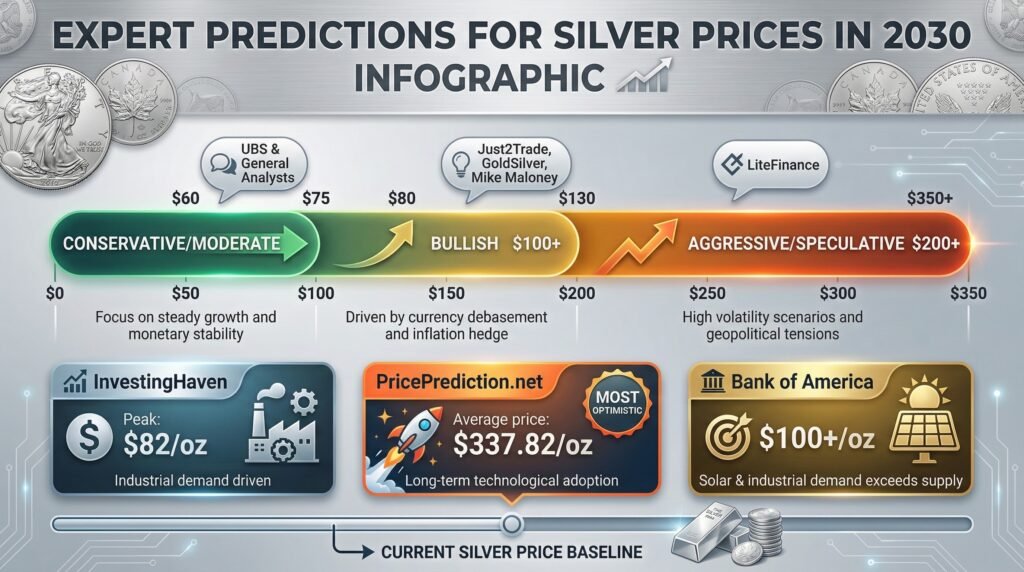How Much Will Silver Be Worth in 2030?

By analyzing current market trends and expert predictions, we can estimate potential scenarios for silver prices in 2030, ranging from a modest price of $70 per ounce according to the World Bank to more optimistic projections of $337.82 by PricePrediction.net.
Predicting the future value of silver is a challenging task, as it is influenced by multiple factors, including economic trends, industrial demand, geopolitical events, and investor sentiment.
Current Market Overview
By the end of 2025, silver was trading around $78 per troy ounce. Silver prices have been fluctuating due to economic uncertainty, inflation, and growing industrial demand.
This upward trend suggests that silver may continue to appreciate, particularly as global markets evolve and industrial applications expand.
One of the key aspects to consider when analyzing silver’s value is the supply and demand equation. Silver production has remained relatively stable, but demand has been growing due to increasing industrial applications and investor interest.
The mining industry is also facing challenges, such as stricter environmental regulations and declining ore grades, which may further impact silver’s availability and, subsequently, its price.
Industrial Demand and Technological Advancements
Silver is a critical component in several industries, including electronics, solar energy, and medical technology. The following factors will likely drive its demand:
-
- Renewable Energy Sector: The increasing adoption of solar energy heavily relies on silver for photovoltaic cells. The demand for solar panels is expected to grow exponentially, boosting silver consumption.
- Electric Vehicle Industry: Advances in battery technology, including silver-carbon composite layers in solid-state batteries, could increase silver demand significantly.
- Electronics and 5G Technology: The expansion of 5G networks and the production of advanced electronic devices will require more silver for manufacturing purposes.
- Healthcare Industry: Silver’s antibacterial properties make it a crucial element in medical devices, bandages, and water purification systems. With growing concerns over antibiotic resistance, silver-based medical solutions are expected to gain more traction.
- Emerging Technologies: Innovations in nanotechnology and AI-driven industries may further contribute to the increasing demand for silver in various high-tech applications.
Economic Factors and Inflation Impact
Silver is often viewed as a hedge against inflation. As central banks continue to implement monetary policies that influence inflation rates, silver’s value is expected to respond accordingly.
If inflation remains high, more investors may turn to silver as a store of value, further increasing its price.
Additionally, economic stability and interest rates play a significant role in silver pricing. Historically, during economic downturns and periods of uncertainty, silver prices tend to rise as investors seek safe-haven assets.
On the other hand, when interest rates are high, investors may prefer other investment options, which could temporarily suppress silver prices.
To better understand inflation and market trends and their impact on silver prices, consider working with a trusted gold investment company.
Silver IRA companies, more specifically, provide a tax-advantaged way of buying and owning gold without the stress of dealing with local or online vendors or the need for security and storage in your own home.
These companies can provide access to competitive prices, price transparency, a reasonable buyback policy, reliable customer service, and security of your precious metals.
Finding the right gold and silver IRA company for your individual needs is critical. For example, if you require a low investment minimum to start a silver IRA, Birch Gold Group or American Hartford Gold would be two choices to consider.
However, if you are a serious high-net-worth investor who can afford a higher minimum to take advantage of the most competitive silver prices as well as lifetime customer support, then Augusta Precious Metals would be a good fit.
Additionally, National Gold Group is a family-owned company that provides a personalized approach to gold investing as well as a low minimum investment and great educational resources for its clients.
Furthermore, Noble Gold Investments provides gold and silver IRAs as well as private investment options for home storage. See the links in the video description to find the right gold and silver IRA company that best serves your needs.
To learn more about how gold investing can protect your long-term wealth and the advantages of tax-deferred silver and gold IRAs, click the banner below to access and download Augusta Precious Metals’ gold IRA checklist to make sure you are aware of all aspects of the gold IRA process:
Expert Predictions for Silver Prices in 2030
Different analysts and financial institutions have projected varying price ranges for silver in 2030:
1.Conservative/Moderate: $60 – $75 per ounce (UBS, general analysts).
2. Bullish: $80 – $100+ per ounce (Just2Trade, GoldSilver, Mike Maloney).
3.Aggressive/Speculative: $130 – $200+ (LiteFinance).
4.InvestingHaven: Predicts a potential peak price of $82 per ounce, driven by industrial demand and market trends.
5. PricePrediction.net: Provides a highly optimistic projection, suggesting an average silver price of $337.82 in 2030.
6. Bank of America: Suggests that if silver demand in solar and industrial applications continues to outpace supply, prices could rise to $100 or more by 2030.
Market Risks and Volatility
While the outlook for silver appears positive, certain risks and challenges could impact its value:
-
- Global Economic Downturns: Recessions or economic slowdowns may reduce industrial demand for silver.
- Mining Supply Constraints: A decrease in silver mining output due to environmental regulations or geopolitical instability could push prices higher.
- Investment Demand Fluctuations: Silver’s appeal as an investment asset depends on economic stability and investor sentiment.
- Technological Substitutions: Advances in material sciences may lead to alternative materials replacing silver in some industrial applications, potentially reducing demand.
- Government Policies and Regulations: Changes in taxation, trade policies, or environmental laws could impact the supply chain and production costs of silver.
Investment Considerations
If you are considering investing in silver for the long term, here are some strategies to keep in mind:
1. Physical Silver: Buying silver coins and bullion can be a secure way to hold tangible assets.
2. Silver ETFs and Mutual Funds: Exchange-traded funds provide a convenient way to invest in silver without holding physical metal.
3. Mining Stocks: Investing in companies that mine silver can offer exposure to the commodity while diversifying risk.
4. Silver Futures and Options: These are riskier but offer potential for high returns for experienced investors.
5. Silver IRA Accounts: For long-term investors, opening a silver-backed IRA can provide tax advantages while benefiting from potential silver price appreciation.
6. Numismatic and Rare Silver Coins: Collecting rare silver coins can provide an alternative way to invest in silver, often with higher premiums but unique value appreciation potential.
Click the banner below to see the present promotions from American Hartford Gold.
Conclusion
Predicting the exact price of silver in 2030 is difficult, but given current market trends, increasing industrial demand, and economic conditions, silver has strong potential for appreciation.
Whether for industrial use or as a hedge against inflation, silver remains a valuable asset to consider. Investors should conduct thorough research and consider market risks before making investment decisions.
For those looking to add silver to their investment portfolio, staying informed about economic trends, technological advancements, and geopolitical events will be essential.
With the right strategy, silver can be a key component of a diversified investment approach, offering both stability and growth potential over the coming years.
Obtain a gold IRA guide and talk to a broker




If you have 100k in savings to protect, attend a gold investment educational webinar hosted by Augusta Precious Metals. Tap the button below:
Gold IRA FAQs

Adam ONeill
Author, lifelong investor, and creator of PreciousMetalsInvestmentPortfolio.com

